Ward A.W. The Cambridge History of British Foreign Policy. 1783-1919. Volume 3
Подождите немного. Документ загружается.

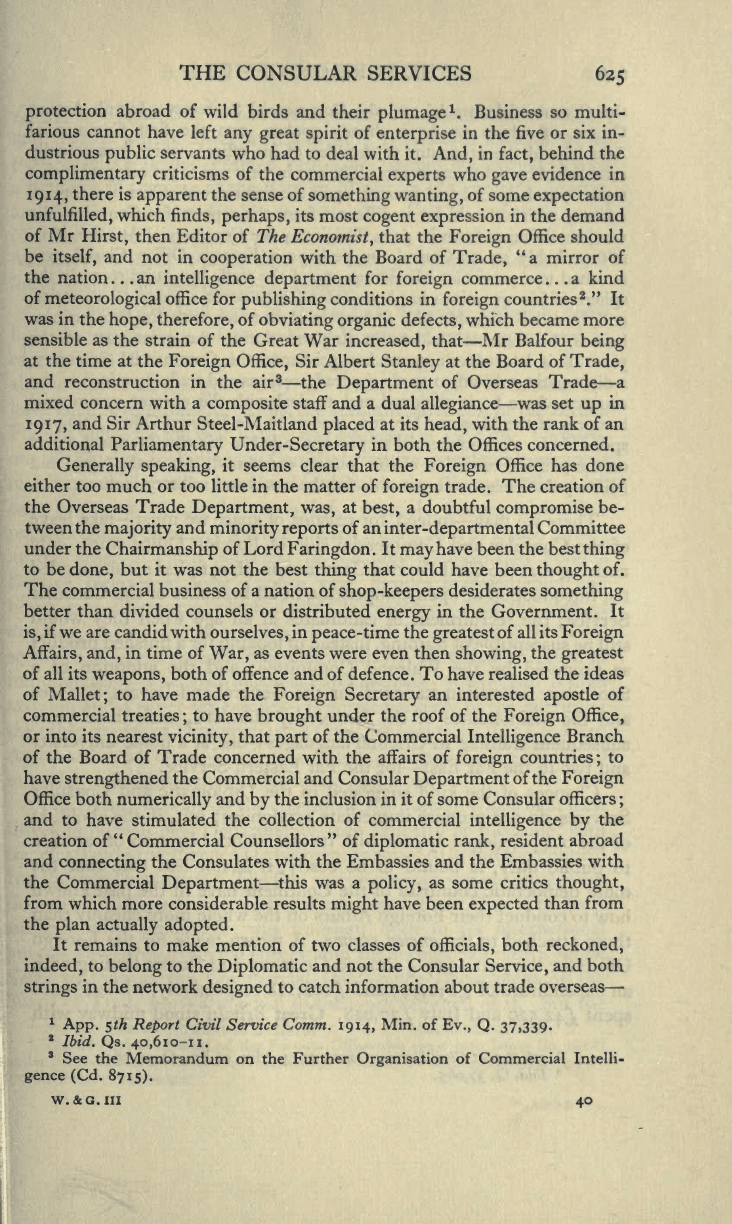
THE
CONSULAR SERVICES
625
protection
abroad of
wild birds
and
their
plumage
1
. Business
so
multi-
farious
cannot
have
left
any great spirit
of
enterprise
in the five
or
six
in-
dustrious
public
servants
who had
to
deal
with
it.
And,
in
fact,
behind
the
complimentary
criticisms of
the commercial
experts
who
gave
evidence
in
1914,
there
is
apparent
the
sense
of
something
wanting,
of
some
expectation
unfulfilled,
which
finds,
perhaps,
its most
cogent expression
in
the
demand
of Mr
Hirst,
then Editor of
The
Economist,
that the
Foreign
Office should
be
itself,
and
not in
cooperation
with
the Board of
Trade,
"a mirror of
the nation
... an
intelligence
department
for
foreign
commerce
...
a kind
of
meteorological
office for
publishing
conditions
in
foreign
countries
2
."
It
was
in the
hope,
therefore,
of
obviating
organic
defects,
which
became more
sensible
as
the
strain of
the Great
War
increased,
that
—
Mr Balfour
being
at
the
time
at
the
Foreign
Office,
Sir
Albert
Stanley
at
the
Board
of
Trade,
and
reconstruction in
the
air
3
—
the
Department
of
Overseas
Trade
—
a
mixed
concern
with
a
composite
staff
and a dual
allegiance
—
was
set
up
in
1917,
and
Sir
Arthur
Steel-Maitland
placed
at its
head,
with
the rank
of an
additional
Parliamentary Under-Secretary
in
both the Offices
concerned.
Generally
speaking,
it seems
clear that the
Foreign
Office has
done
either too much or too little in
the
matter of
foreign
trade. The
creation
of
the Overseas Trade
Department,
was,
at
best,
a doubtful
compromise
be-
tween the
majority
and
minority reports
of an
inter-departmental
Committee
under
the
Chairmanship
of Lord
Faringdon.
It
may
have
been the best
thing
to
be
done,
but it was
not
the best
thing
that
could have been
thought
of
.
The commercial business of a nation of
shop-keepers
desiderates
something
better
than divided counsels
or
distributed
energy
in
the Government.
It
is,
if
we are
candid
with
ourselves,
in
peace-time
the
greatest
of all its
Foreign
Affairs,
and,
in time of
War,
as
events were
even then
showing,
the
greatest
of all its
weapons,
both
of
offence and of
defence.
To
have
realised the
ideas
of
Mallet;
to
have made the
Foreign Secretary
an interested
apostle
of
commercial treaties
;
to
have
brought
under
the
roof of
the
Foreign
Office,
or
into its nearest
vicinity,
that
part
of
the
Commercial
Intelligence
Branch
of the Board of Trade concerned
with the
affairs of
foreign
countries
;
to
have
strengthened
the Commercial and Consular
Department
of
the
Foreign
Office
both
numerically
and
by
the
inclusion
in it of some
Consular
officers
;
and to
have
stimulated
the collection
of
commercial
intelligence
by
the
creation of
"
Commercial Counsellors"
of
diplomatic
rank,
resident
abroad
and
connecting
the Consulates with
the Embassies
and
the
Embassies with
the
Commercial
Department
—
this
was
a
policy,
as some critics
thought,
from
which more considerable
results
might
have
been
expected
than
from
the
plan
actually adopted.
It
remains
to
make mention of two
classes
of
officials,
both
reckoned,
indeed,
to
belong
to
the
Diplomatic
and not
the Consular
Service,
and
both
strings
in
the network
designed
to catch information
about trade overseas
—
1
App. 5th
Report
Civil Service
Comm.
1914,
Min. of
Ev.,
Q.
37,339.
2
Ibid.
Qs.
40,610-11.
8
See the
Memorandum on the Further
Organisation
of
Commercial Intelli-
gence
(Cd.
8715).
w.&g.iii
40
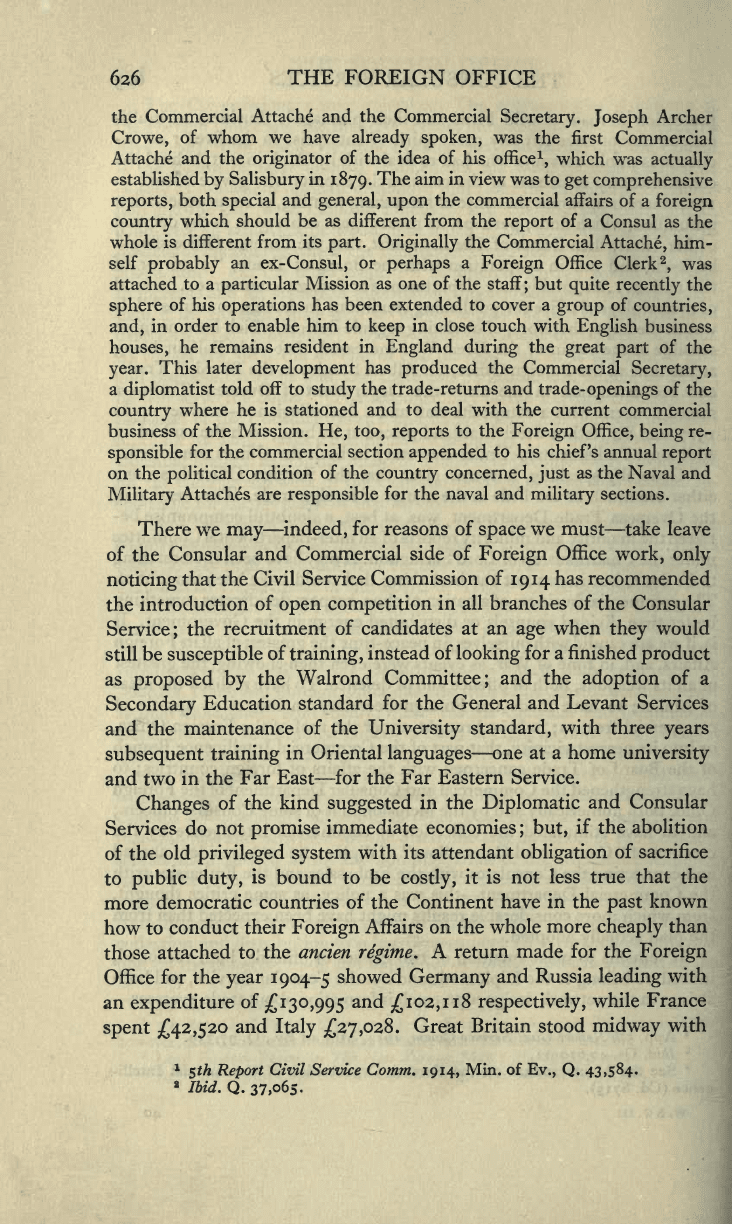
626
THE
FOREIGN
OFFICE
the Commercial
Attache
and the
Commercial
Secretary.
Joseph
Archer
Crowe,
of whom
we
have
already spoken,
was
the first
Commercial
Attache
and the
originator
of the idea of his
office
1
,
which was
actually
established
by
Salisbury
in
1879.
The
aim in
view was to
get
comprehensive
reports,
both
special
and
general, upon
the
commercial
affairs of a
foreign
country
which
should be
as
different from the
report
of
a
Consul
as
the
whole
is
different from its
part. Originally
the Commercial
Attache,
him-
self
probably
an
ex-Consul,
or
perhaps
a
Foreign
Office
Clerk
2
,
was
attached
to a
particular
Mission
as
one
of
the
staff;
but
quite
recently
the
sphere
of
his
operations
has been extended
to
cover
a
group
of
countries,
and,
in
order to enable
him to
keep
in close
touch
with
English
business
houses,
he
remains
resident in
England
during
the
great
part
of
the
year.
This
later
development
has
produced
the
Commercial
Secretary,
a
diplomatist
told
off to
study
the trade-returns
and
trade-
openings
of
the
country
where he
is
stationed and
to
deal
with the current
commercial
business of the
Mission.
He, too,
reports
to
the
Foreign
Office,
being
re-
sponsible
for
the
commercial section
appended
to his
chief's annual
report
on
the
political
condition
of
the
country
concerned,
just
as
the Naval and
Military
Attaches
are
responsible
for
the naval
and
military
sections.
There
we
may
—
indeed,
for reasons
of
space
we
must
—
take
leave
of
the
Consular
and Commercial
side of
Foreign
Office
work,
only
noticing
that the
Civil Service
Commission of
19
14
has
recommended
the
introduction
of
open
competition
in
all
branches of
the Consular
Service;
the
recruitment
of candidates at
an
age
when
they
would
still
be
susceptible
of
training,
instead
of
looking
for a finished
product
as
proposed
by
the
Walrond
Committee;
and
the
adoption
of
a
Secondary
Education
standard
for
the
General
and
Levant Services
and
the
maintenance
of
the
University
standard,
with three
years
subsequent
training
in
Oriental
languages
—
one
at
a home
university
and
two
in
the
Far
East
—
for
the
Far
Eastern
Service.
Changes
of
the
kind
suggested
in
the
Diplomatic
and
Consular
Services
do not
promise
immediate
economies
;
but,
if
the
abolition
of
the
old
privileged
system
with
its attendant
obligation
of
sacrifice
to
public
duty,
is
bound to be
costly,
it
is not
less true that the
more
democratic countries
of
the
Continent
have
in
the
past
known
how
to
conduct
their
Foreign
Affairs on
the
whole
more
cheaply
than
those
attached
to
the ancien
regime.
A
return
made
for
the
Foreign
Office
for
the
year
1904-5
showed
Germany
and Russia
leading
with
an
expenditure
of
£130,995
and
£102,118
respectively,
while
France
spent
£42,520
and
Italy £27,028.
Great Britain stood
midway
with
1
$th Report
Civil
Service Comtn.
1914,
Min.
of
Ev.,
Q.
43>s84-
8
Ibid.
Q.
37>°6s.
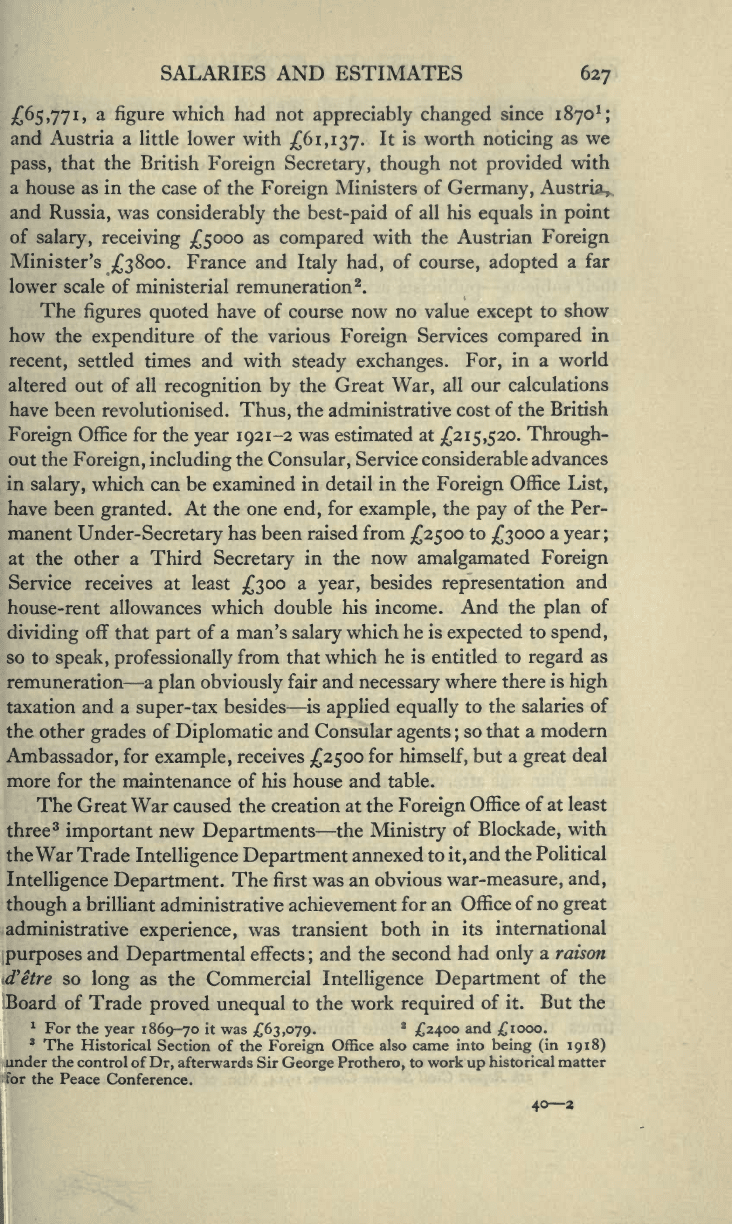
SALARIES
AND ESTIMATES
627
£65,771,
a
figure
which
had not
appreciably
changed
since
1870
1
;
and
Austria
a
little lower
with
£61,137.
^
* s
worth
noticing
as
we
pass,
that the
British
Foreign Secretary, though
not
provided
with
a
house as
in
the case of
the
Foreign
Ministers
of
Germany,
Austria,
and
Russia,
was
considerably
the
best-paid
of
all his
equals
in
point
of
salary,
receiving £5000
as
compared
with
the
Austrian
Foreign
Minister's
£3800.
France
and
Italy
had,
of
course,
adopted
a far
lower scale of
ministerial remuneration
2
.
The
figures quoted
have of course now
no value
except
to
show
how
the
expenditure
of the
various
Foreign
Services
compared
in
recent,
settled times
and
with
steady exchanges.
For,
in a
world
altered
out
of all
recognition by
the Great
War,
all our
calculations
have
been
revolutionised.
Thus,
the
administrative
cost
of the
British
Foreign
Office for
the
year 192
1-2 was estimated
at
£215,520.
Through-
out the
Foreign, including
the
Consular,
Service
considerable
advances
in
salary,
which can be examined
in
detail
in
the
Foreign
Office
List,
have been
granted.
At
the
one
end,
for
example,
the
pay
of
the
Per-
manent
Under-Secretary
has been raised
from
£2500
to
£3000
a
year;
at the other a
Third
Secretary
in
the
now
amalgamated
Foreign
Service receives at least
£300
a
year,
besides
representation
and
house-rent allowances
which double
his income. And the
plan
of
dividing
off
that
part
of a man's
salary
which he
is
expected
to
spend,
so
to
speak, professionally
from
that
which he
is
entitled
to
regard
as
remuneration
—
a
plan obviously
fair
and
necessary
where there
is
high
taxation
and
a
super-tax
besides
—
is
applied equally
to the
salaries
of
the
other
grades
of
Diplomatic
and Consular
agents
;
so that
a modern
Ambassador,
for
example,
receives
£2500
for
himself,
but
a
great
deal
more for
the
maintenance
of his house
and
table.
The
Great War caused
the
creation at the
Foreign
Office
of
at
least
three
3
important
new
Departments
—
the
Ministry
of
Blockade,
with
the War
Trade
Intelligence Department
annexed
to
it,
and
the
Political
Intelligence
Department.
The
first
was an obvious
war-measure,
and,
though
a
brilliant
administrative
achievement
for an Office
of
no
great
administrative
experience,
was
transient both
in
its
international
purposes
and
Departmental
effects
;
and
the
second
had
only
a
raison
d'etre
so
long
as
the Commercial
Intelligence
Department
of
the
Board of
Trade
proved
unequal
to
the
work
required
of
it.
But the
1
For the
year
1869-70
it
was
£63,079.
*
£2400
and
£1000.
8
The
Historical
Section of
the
Foreign
Office
also came into
being
(in
1918)
under the
control of
Dr,
afterwards Sir
George
Prothero,
to
work
up
historical matter
for
the
Peace
Conference.
40
—
2
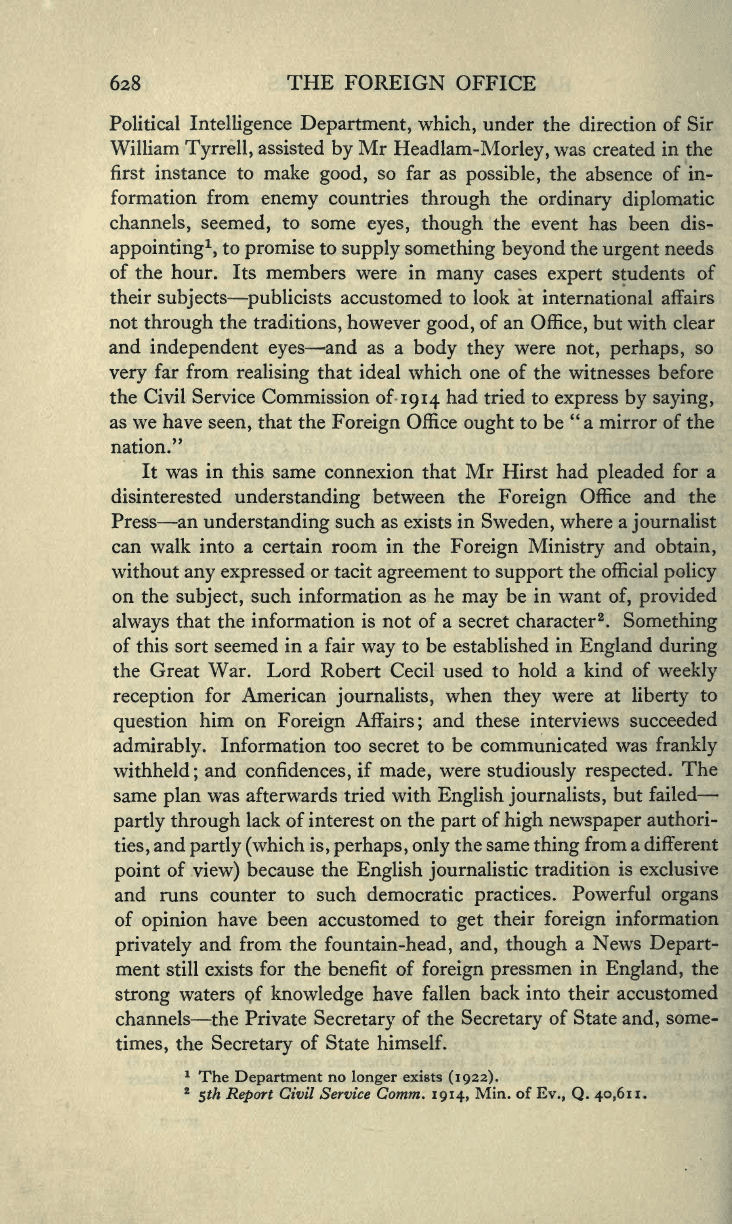
628
THE
FOREIGN
OFFICE
Political
Intelligence Department,
which,
under
the direction
of Sir
William
Tyrrell,
assisted
by
Mr
Headlam-Morley,
was
created
in
the
first instance
to
make
good,
so far as
possible,
the absence
of in-
formation
from
enemy
countries
through
the
ordinary
diplomatic
channels,
seemed,
to
some
eyes,
though
the event has
been
dis-
appointing
1
,
to
promise
to
supply
something
beyond
the
urgent
needs
of
the hour.
Its
members
were in
many
cases
expert
students
of
their
subjects
—
publicists
accustomed to look
at international
affairs
not
through
the
traditions,
however
good,
of an
Office,
but with
clear
and
independent
eyes
—
and
as a
body they
were
not,
perhaps,
so
very
far from
realising
that
ideal
which one of
the
witnesses
before
the
Civil Service Commission of
1914
had
tried
to
express by saying,
as
we have
seen,
that the
Foreign
Office
ought
to be
"
a
mirror of
the
nation."
It
was
in
this
same connexion
that
Mr
Hirst
had
pleaded
for a
disinterested
understanding
between the
Foreign
Office
and
the
Press
—
an
understanding
such as
exists
in
Sweden,
where
a
journalist
can walk into
a
certain
room in
the
Foreign Ministry
and
obtain,
without
any expressed
or
tacit
agreement
to
support
the
official
policy
on
the
subject,
such information
as he
may
be
in
want
of,
provided
always
that the information
is
not
of a
secret character
2
.
Something
of
this sort seemed
in
a fair
way
to
be
established
in
England
during
the Great
War. Lord
Robert
Cecil used to
hold
a
kind of
weekly
reception
for
American
journalists,
when
they
were
at
liberty
to
question
him
on
Foreign
Affairs;
and these interviews
succeeded
admirably.
Information too secret to
be
communicated
was
frankly
withheld;
and
confidences,
if
made,
were
studiously
respected.
The
same
plan
was
afterwards
tried with
English
journalists,
but
failed
—
partly
through
lack of interest
on the
part
of
high
newspaper
authori-
ties,
and
partly
(which
is,
perhaps, only
the same
thing
from a
different
point
of
view)
because
the
English
journalistic
tradition
is
exclusive
and
runs
counter
to such democratic
practices.
Powerful
organs
of
opinion
have been
accustomed to
get
their
foreign
information
privately
and from the
fountain-head,
and,
though
a News
Depart-
ment still exists
for
the benefit
of
foreign
pressmen
in
England,
the
strong
waters of
knowledge
have
fallen
back into
their
accustomed
channels
—
the
Private
Secretary
of the
Secretary
of
State
and,
some-
times,
the
Secretary
of
State
himself.
1
The
Department
no
longer
exists
(1922).
2
$th Report
Civil
Service Comm.
1914,
Min. of
Ev.,
Q.
40,611.
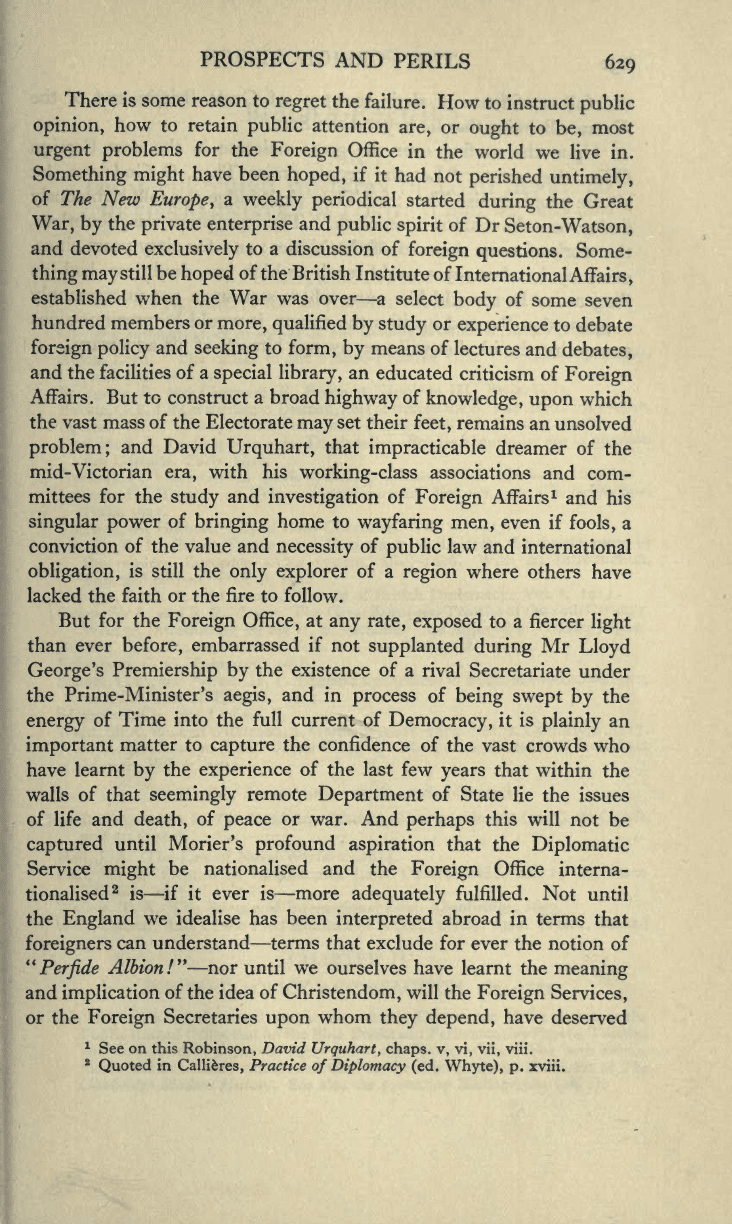
PROSPECTS
AND
PERILS
629
There
is
some
reason to
regret
the
failure.
How
to
instruct
public
opinion,
how
to retain
public
attention
are,
or
ought
to
be,
most
urgent
problems
for
the
Foreign
Office
in
the world
we
live
in.
Something might
have been
hoped,
if
it
had
not
perished
untimely,
of
The New
Europe,
a
weekly periodical
started
during
the
Great
War,
by
the
private enterprise
and
public
spirit
of
Dr
Seton-Watson,
and devoted
exclusively
to
a
discussion
of
foreign
questions.
Some-
thing may
still
be
hoped
of the
British
Institute of
International
Affairs,
established when the War was over
—
a
select
body
of
some
seven
hundred
members
or
more,
qualified by
study
or
experience
to
debate
foreign
policy
and
seeking
to
form,
by
means
of
lectures
and
debates,
and
the facilities
of a
special library,
an
educated
criticism of
Foreign
Affairs.
But
to
construct
a
broad
highway
of
knowledge,
upon
which
the
vast
mass of
the Electorate
may
set their
feet,
remains
an
unsolved
problem;
and David
Urquhart,
that
impracticable
dreamer of
the
mid-
Victorian
era,
with
his
working-class
associations
and com-
mittees
for
the
study
and
investigation
of
Foreign
Affairs
1
and his
singular power
of
bringing
home to
wayfaring
men,
even
if
fools,
a
conviction
of the value and
necessity
of
public
law and
international
obligation,
is
still
the
only explorer
of
a
region
where others
have
lacked the faith
or
the fire to
follow.
But
for
the
Foreign
Office,
at
any
rate,
exposed
to a
fiercer
light
than
ever
before,
embarrassed if
not
supplanted
during
Mr
Lloyd
George's
Premiership by
the
existence
of
a
rival
Secretariate
under
the
Prime-Minister's
aegis,
and
in
process
of
being swept
by
the
energy
of Time into the
full
current of
Democracy,
it
is
plainly
an
important
matter
to
capture
the
confidence
of the
vast
crowds who
have
learnt
by
the
experience
of the
last few
years
that
within
the
walls of
that
seemingly
remote
Department
of
State lie
the issues
of life and
death,
of
peace
or
war. And
perhaps
this
will
not
be
captured
until
Morier's
profound
aspiration
that
the
Diplomatic
Service
might
be
nationalised
and
the
Foreign
Office interna-
tionalised
2
is
—
if
it
ever is
—
more
adequately
fulfilled.
Not until
the
England
we idealise has
been
interpreted
abroad
in
terms
that
foreigners
can understand
—
terms
that exclude
for
ever
the notion
of
"
Perfide
Albion!"
—
nor until
we
ourselves have
learnt the
meaning
and
implication
of
the
idea
of
Christendom,
will
the
Foreign
Services,
or the
Foreign
Secretaries
upon
whom
they
depend,
have
deserved
1
See
on
this
Robinson,
David
Urquhart,
chaps,
v, vi, vii,
viii.
2
Quoted
in
Callieres,
Practice
of
Diplomacy (ed.
Whyte), p.
xviii.
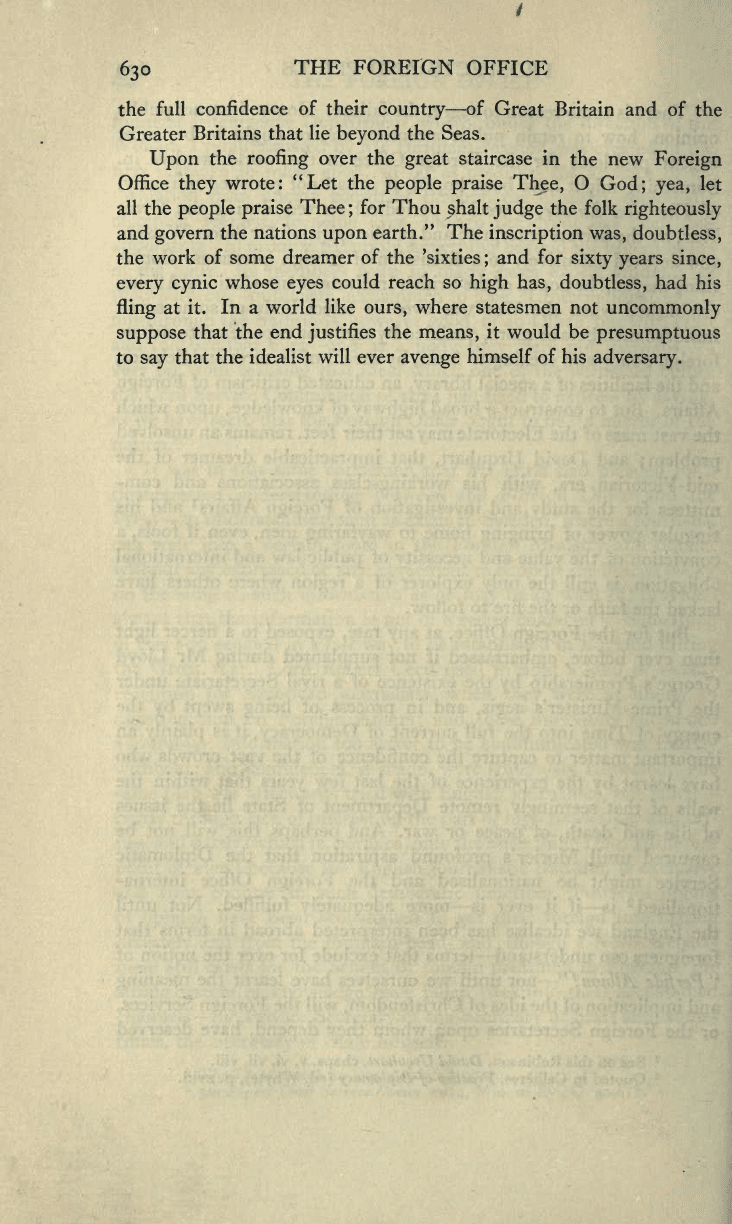
630
THE FOREIGN
OFFICE
the
full
confidence
of
their
country
—
of
Great
Britain
and of
the
Greater
Britains that
lie
beyond
the Seas.
Upon
the
roofing
over
the
great
staircase
in
the new
Foreign
Office
they
wrote:
"Let the
people praise
Thee,
O
God;
yea,
let
all
the
people
praise
Thee;
for Thou
shalt
judge
the folk
righteously
and
govern
the nations
upon
earth." The
inscription
was,
doubtless,
the
work
of some dreamer
of
the
'sixties;
and for
sixty
years
since,
every
cynic
whose
eyes
could reach so
high
has, doubtless,
had his
fling
at it.
In
a
world like
ours,
where
statesmen not
uncommonly
suppose
that the
end
justifies
the
means,
it would be
presumptuous
to
say
that
the idealist
will ever
avenge
himself
of his
adversary.
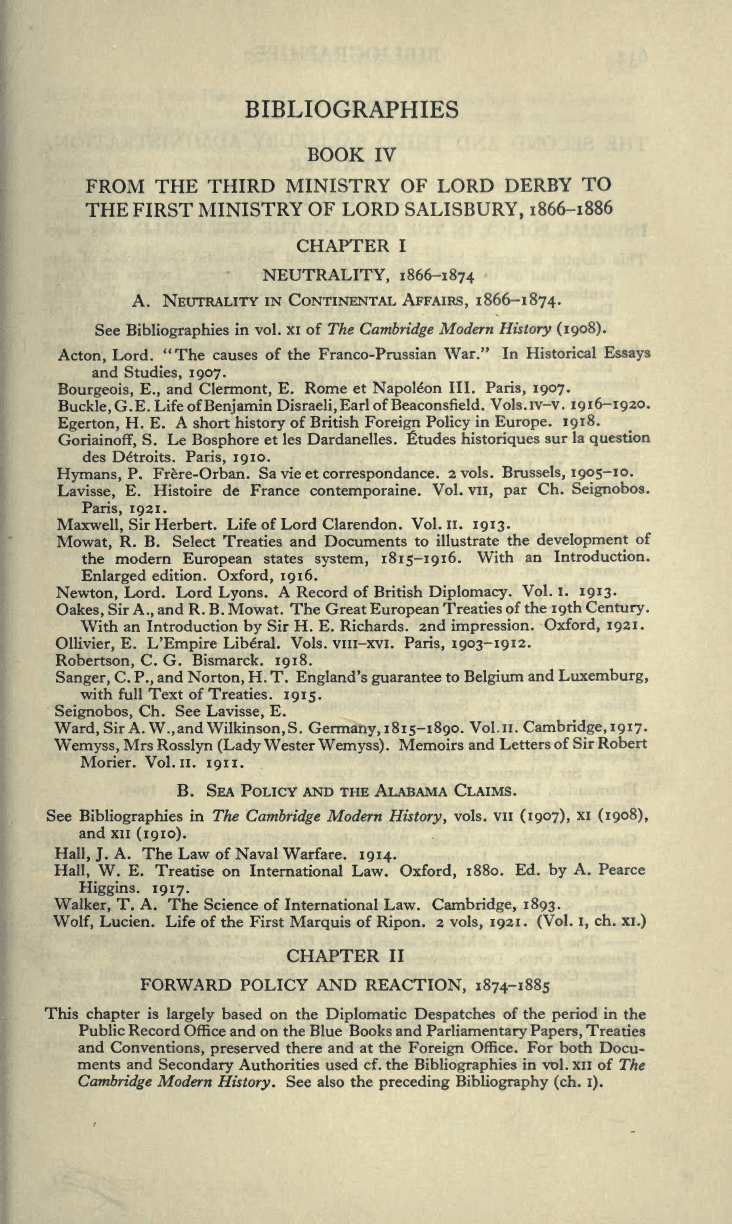
BIBLIOGRAPHIES
BOOK
IV
FROM THE
THIRD
MINISTRY
OF LORD
DERBY
TO
THE FIRST MINISTRY
OF
LORD
SALISBURY,
1866-1886
CHAPTER
I
NEUTRALITY,
1866-1874
A. Neutrality
in Continental
Affairs,
1 866-1
874.
See
Bibliographies
in
vol.
xi
of
The
Cambridge
Modern
History
(1908).
Acton,
Lord. "The causes
of
the Franco-Prussian
War."
In
Historical
Essays
and
Studies, 1907.
Bourgeois,
E.,
and
Clermont,
E.
Rome et
Napoleon
III.
Paris, 1907.
Buckle.G.E.
Life of
Benjamin
Disraeli,
Earl
of Beaconsfield.
Vols.iv-v.
1916-1920.
Egerton,
H.
E.
A short
history
of
British
Foreign Policy
in
Europe.
191
8.
Goriainoff,
S. Le
Bosphore
et
les Dardanelles, fitudes
historiques
sur
la
question
des D£troits.
Paris,
191
o.
Hymans,
P. Frere-Orban.
Sa vie et
correspondance.
2
vols.
Brussels,
1905-10.
Lavisse,
E. Histoire
de
France
contemporaine.
Vol.
vu,
par
Ch.
Seignobos.
Paris,
1
92
1.
Maxwell,
Sir
Herbert.
Life of Lord Clarendon.
Vol.11.
1913.
Mowat,
R. B. Select
Treaties and Documents
to illustrate
the
development
of
the modern
European
states
system,
181
5-19
16.
With
an
Introduction.
Enlarged
edition.
Oxford, 1916.
Newton,
Lord.
Lord
Lyons.
A
Record
of British
Diplomacy.
Vol.
I.
1913*
Oakes,
Sir
A.,
and R.
B.
Mowat. The Great
European
Treaties
of the
19th
Century.
With an Introduction
by
Sir H. E.
Richards. 2nd
impression.
Oxford, 1921.
Ollivier,
E.
L'Empire
Liberal.
Vols, vm-xvi.
Paris, 1903-1912.
Robertson,
C. G.
Bismarck.
1918.
Sanger,
C.
P.,
and
Norton,
H. T.
England's guarantee
to
Belgium
and
Luxemburg,
with full
Text of Treaties.
1915.
Seignobos,
Ch. See
Lavisse,
E.
Ward,
Sir A.
W.,
and
Wilkinson,
S.
Germany,
181
5-1890.
Vol.11.
Cambridge,
19
17.
Wemyss,
Mrs
Rosslyn (Lady
Wester
Wemyss).
Memoirs
and Letters
of Sir
Robert
Morier.
Vol.11.
1911.
B. Sea Policy
and the
Alabama
Claims.
See
Bibliographies
in
The
Cambridge
Modern
History,
vols,
vu
(1907).
XI
(i9
o8
)>
and xn
(1910).
Hall, J.
A.
The
Law of Naval
Warfare.
1914.
Hall,
W. E.
Treatise
on
International Law.
Oxford,
1880.
Ed.
by
A.
Pearce
Higgins.
1
9
17.
Walker,
T.
A.
The Science of International
Law.
Cambridge,
1893.
Wolf,
Lucien. Life of the First
Marquis
of
Ripon.
2
vols, 1921.
(Vol.
I,
ch.
xi.)
CHAPTER II
FORWARD
POLICY
AND
REACTION,
1874-1885
This
chapter
is
largely
based on the
Diplomatic Despatches
of the
period
in
the
Public
Record
Office and on the
Blue
Books
and
Parliamentary Papers,
Treaties
and
Conventions,
preserved
there
and at the
Foreign
Office. For both
Docu-
ments and
Secondary
Authorities
used
cf. the
Bibliographies
in
vol. XII of
The
Cambridge
Modern
History.
See
also
the
preceding
Bibliography
(ch.
1).
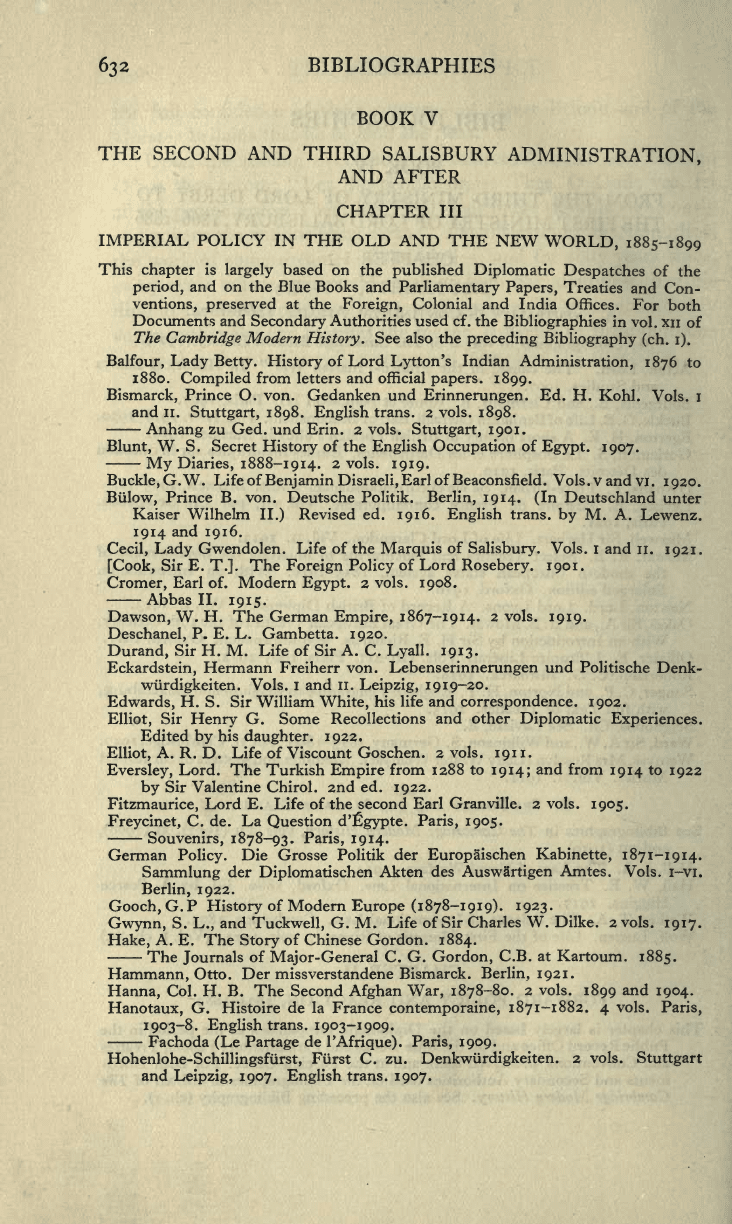
632
BIBLIOGRAPHIES
BOOK
V
THE SECOND AND THIRD
SALISBURY
ADMINISTRATION,
AND AFTER
CHAPTER III
IMPERIAL
POLICY IN THE
OLD AND THE
NEW
WORLD,
1885-1899
This
chapter
is
largely
based on
the
published Diplomatic
Despatches
of
the
period,
and on the
Blue Books and
Parliamentary Papers,
Treaties
and
Con-
ventions,
preserved
at the
Foreign,
Colonial and
India
Offices.
For
both
Documents and
Secondary
Authorities
used
cf. the
Bibliographies
in
vol. xn of
The
Cambridge
Modern
History.
See also the
preceding
Bibliography
(ch.
1).
Balfour,
Lady Betty. History
of Lord
Lytton's
Indian
Administration,
1876
to
1880.
Compiled
from letters
and official
papers. 1899.
Bismarck,
Prince
O. von. Gedanken
und
Erinnerungen.
Ed. H.
Kohl.
Vols.
1
and
II.
Stuttgart, 1898. English
trans.
2
vols.
1898.
Anhang
zu Ged.
und
Erin.
2
vols.
Stuttgart, 1901.
Blunt,
W. S. Secret
History
of the
English Occupation
of
Egypt. 1907.
My
Diaries,
1888-1914.
2 vols.
1919.
Buckle,
G.W. Life
of
Benjamin Disraeli,
Earl of
Beaconsfield.
Vols, v and
vi.
1920.
Biilow,
Prince
B.
von. Deutsche Politik.
Berlin,
1914.
(In
Deutschland
unter
Kaiser Wilhelm
II.)
Revised
ed.
1916. English
trans,
by
M. A.
Lewenz.
1914
and
1916.
Cecil,
Lady
Gwendolen. Life
of the
Marquis
of
Salisbury.
Vols. 1
and
IX.
1921.
[Cook,
Sir E.
T.].
The
Foreign Policy
of
Lord
Rosebery. 1901.
Cromer,
Earl
of.
Modern
Egypt.
2
vols.
1908.
Abbas
II.
1915.
Dawson,
W. H. The German
Empire,
1867-1914.
2 vols.
1919.
Deschanel,
P. E.
L. Gambetta.
1920.
Durand,
Sir
H.
M. Life of Sir A. C.
Lyall.
1913.
Eckardstein,
Hermann Freiherr
von.
Lebenserinnerungen
und
Politische Denk-
wiirdigkeiten.
Vols. 1
and 11.
Leipzig,
1919-20.
Edwards,
H. S. Sir William
White,
his
life and
correspondence. 1902.
Elliot,
Sir
Henry
G. Some
Recollections
and other
Diplomatic
Experiences.
Edited
by
his
daughter.
1922.
Elliot,
A.
R.
D.
Life of
Viscount
Goschen. 2
vols.
191
1.
Eversley,
Lord. The Turkish
Empire
from
1288
to
19
14;
and from
19
14
to
1922
by
Sir Valentine Chirol. 2nd
ed.
1922.
Fitzmaurice,
Lord E.
Life
of the
second
Earl Granville. 2 vols.
1905.
Freycinet,
C. de. La
Question
d'figypte.
Paris,
1905.
Souvenirs,
1878-93.
Paris,
1914.
German
Policy.
Die Grosse Politik
der
Europaischen
Kabinette,
1871-1914.
Sammlung
der
Diplomatischen
Akten
des
Auswartigen
Amtes.
Vols.
i-vi.
Berlin, 1922.
Gooch,
G.
P
History
of
Modern
Europe (1878-1919).
1923.
Gwynn,
S.
L.,
and
Tuckwell,
G. M.
Life of
Sir Charles
W. Dilke. 2
vols.
1917.
Hake,
A.
E. The
Story
of Chinese Gordon.
1884.
The
Journals
of
Major-General
C.
G.
Gordon,
C.B. at
Kartoum.
1885.
Hammann,
Otto.
Der missverstandene
Bismarck.
Berlin,
192
1.
Hanna,
Col. H.
B. The Second
Afghan
War, 1878-80.
2 vols.
1899
and
1904.
Hanotaux,
G.
Histoire
de la
France
contemporaine,
1
871-1882. 4
vols.
Paris,
1903-8. English
trans.
1
903-1 909.
Fachoda
(Le
Partage
de
l'Afrique).
Paris,
1909.
Hohenlohe-Schillingsfurst,
Fiirst C.
zu.
Denkwiirdigkeiten.
2 vols.
Stuttgart
and
Leipzig, 1907.
English
trans.
1907.
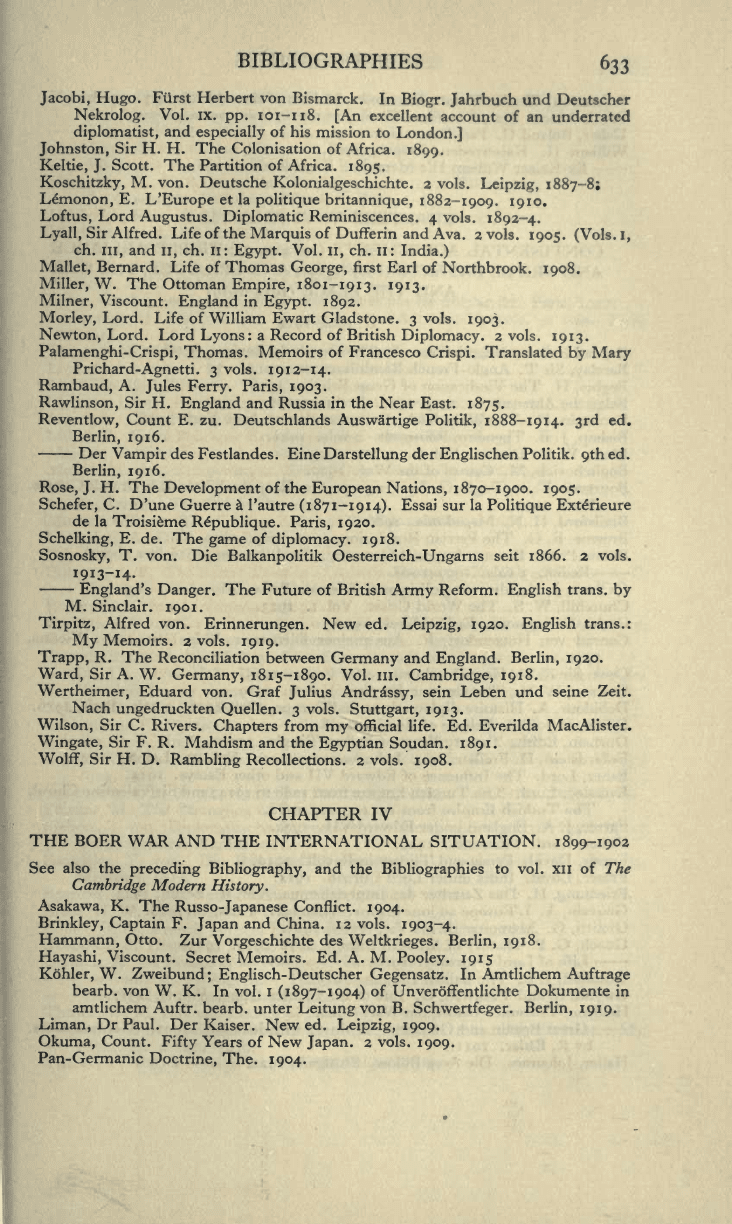
BIBLIOGRAPHIES
633
Jacobi,
Hugo.
Furst
Herbert von
Bismarck. In
Biogr.
Jahrbuch
und Deutscher
Nekrolog.
Vol. ix.
pp.
101-118.
[An
excellent
account
of an
underrated
diplomatist,
and
especially
of
his
mission
to
London.]
Johnston,
Sir
H.
H.
The Colonisation
of
Africa.
1899.
Keltie,
J.
Scott.
The Partition
of
Africa.
1895.
Koschitzky,
M. von.
Deutsche
Kolonialgeschichte.
2
vols.
Leipzig,
1887-8;
Lemonon,
E.
L'Europe
et
la
politique
britannique,
1882-1909.
1910.
Loftus,
Lord
Augustus. Diplomatic
Reminiscences.
4
vols.
1892-4.
Lyall,
Sir
Alfred.
Life of
the
Marquis
of
Dufferin
and
Ava. 2
vols.
1905.
(Vols.
I,
ch.
in,
and
II,
ch.
11:
Egypt.
Vol.
11,
ch. 11:
India.)
Mallet,
Bernard.
Life
of
Thomas
George,
first Earl
of
Northbrook.
1908.
Miller,
W. The
Ottoman
Empire, 1801-1913.
1913.
Milner,
Viscount.
England
in
Egypt.
1892.
Morley,
Lord.
Life
of
William Ewart
Gladstone.
3
vols.
1903.
Newton,
Lord. Lord
Lyons:
a Record of British
Diplomacy.
2 vols.
1913.
Palamenghi-Crispi,
Thomas.
Memoirs of
Francesco
Crispi.
Translated
by Mary
Prichard-Agnetti.
3
vols.
191
2-14.
Rambaud,
A.
Jules
Ferry.
Paris,
1903.
Rawlinson,
Sir
H.
England
and
Russia
in the Near East.
1875.
Reventlow,
Count E.
zu. Deutschlands
Auswartige
Politik,
1888-1914. 3rd
ed.
Berlin,
1916.
Der
Vampir
des
Festlandes.
Eine
Darstellung
der
Englischen
Politik.
9th
ed.
Berlin,
19
16.
Rose, J.
H. The
Development
of the
European
Nations,
1870-1900. 1905.
Schefer,
C.
D'une
Guerre
a
l'autre
(1871-1914).
Essai
sur
la
Politique
Ext^rieure
de la
Troisieme
Republique.
Paris,
1920.
Schelking,
E.
de. The
game
of
diplomacy. 1918.
Sosnosky,
T. von. Die
Balkanpolitik Oesterreich-Ungarns
seit 1866. 2 vols.
1913-14-
England's
Danger.
The
Future
of British
Army
Reform.
English
trans,
by
M.
Sinclair.
1901.
Tirpitz,
Alfred
von.
Erinnerungen.
New
ed.
Leipzig,
1920.
English
trans.:
My
Memoirs.
2 vols.
19 19.
Trapp,
R. The
Reconciliation
between
Germany
and
England.
Berlin, 1920.
Ward,
Sir
A.
W.
Germany, 1815-1890.
Vol. in.
Cambridge, 1918.
Wertheimer,
Eduard von.
Graf
Julius
Andrassy,
sein Leben und
seine Zeit.
Nach
ungedruckten
Quellen.
3
vols.
Stuttgart,
191 3.
Wilson,
Sir
C.
Rivers.
Chapters
from
my
official
life.
Ed.
Everilda
MacAlister.
Wingate,
Sir
F. R.
Mahdism and
the
Egyptian
Soudan.
1891.
Wolff,
Sir
H.
D.
Rambling
Recollections.
2
vols.
1908.
CHAPTER
IV
THE
BOER
WAR AND
THE
INTERNATIONAL SITUATION.
1899-1902
See
also
the
preceding
Bibliography,
and
the
Bibliographies
to vol. xn
of
The
Cambridge
Modem
History.
Asakawa,
K. The
Russo-Japanese
Conflict.
1904.
Brinkley, Captain
F.
Japan
and
China. 12 vols.
1903-4.
Hammann,
Otto.
Zur
Vorgeschichte
des
Weltkrieges.
Berlin,
1918.
Hayashi,
Viscount. Secret Memoirs. Ed. A. M.
Pooley.
1915
Kohler,
W.
Zweibund
;
Englisch-Deutscher Gegensatz.
In
Amtlichem
Auftrage
bearb. von
W. K.
In vol.
1
(1897-1904)
of
UnverofTentlichte
Dokumente in
amtlichem
Auftr.
bearb. unter
Leitung
von
B.
Schwertfeger.
Berlin,
1919.
Liman,
Dr
Paul. Der
Kaiser.
New ed.
Leipzig, 1909.
Okuma,
Count.
Fifty
Years of New
Japan.
2
vols.
1909.
Pan-Germanic
Doctrine,
The.
1904.
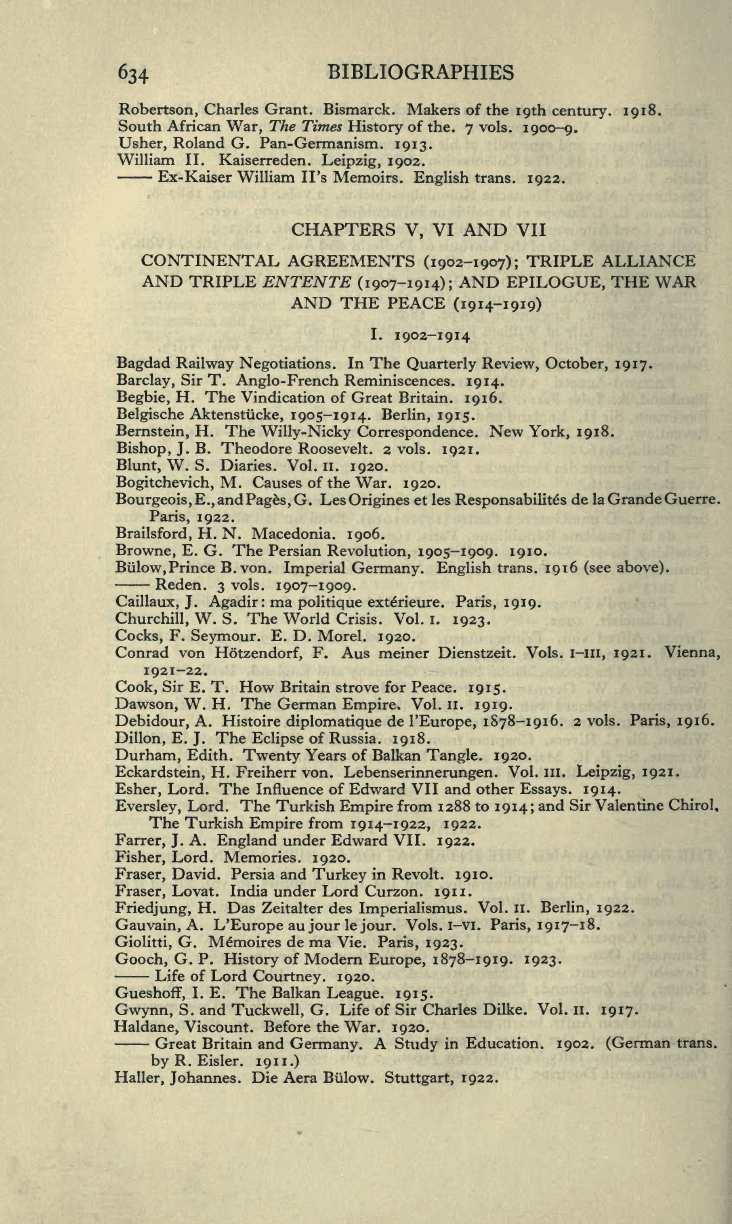
634
BIBLIOGRAPHIES
Robertson,
Charles Grant. Bismarck.
Makers of
the
19th
century. 1918.
South
African
War,
The
Times
History
of
the.
7
vols.
1900-9.
Usher,
Roland
G.
Pan-
Germanism.
191
3.
William II.
Kaiserreden.
Leipzig,
1902.
Ex-Kaiser William IFs
Memoirs.
English
trans.
1922.
CHAPTERS
V,
VI
AND
VII
CONTINENTAL
AGREEMENTS
(1902-1907);
TRIPLE
ALLIANCE
AND
TRIPLE
ENTENTE
(1907-1914);
AND
EPILOGUE,
THE
WAR
AND
THE PEACE
(1914-1919)
I.
1
902-1 9 14
Bagdad
Railway Negotiations.
In
The
Quarterly
Review, October, 1917.
Barclay,
Sir
T.
Anglo-French
Reminiscences.
1914.
Begbie,
H. The
Vindication
of Great Britain.
1916.
Belgische
Aktenstiicke,
1905-1914.
Berlin,
1915.
Bernstein,
H. The
Willy-Nicky Correspondence.
New
York,
1918.
Bishop,
J.
B.
Theodore
Roosevelt.
2
vols.
1921.
Blunt,
W.
S. Diaries. Vol. 11.
1920.
Bogitchevich,
M.
Causes
of the
War.
1920.
Bourgeois,
E.,
and
Pages,
G.
LesOrigines
et les
Responsabilites
de la Grande
Guerre.
Paris,
1922.
Brailsford,
H. N.
Macedonia.
1906.
Browne,
E.
G.
The Persian
Revolution,
1905-1909.
1910.
Biilow,
Prince
B.von.
Imperial Germany.
English
trans.
1916
(see
above).
Reden.
3
vols.
1
907-1 909.
Caillaux, J.
Agadir
:
ma
politique
ext£rieure.
Paris, 1919.
Churchill,
W. S. The World
Crisis. Vol. 1.
1923.
Cocks,
F.
Seymour.
E. D. Morel.
1920.
Conrad von
Hotzendorf,
F.
Aus meiner
Dienstzeit. Vols.
I—
III, 1921.
Vienna,
1921-22.
Cook,
Sir
E. T. How
Britain
strove for
Peace.
1915.
Dawson,
W. H. The German
Empire.
Vol. 11.
1919.
Debidour,
A.
Histoire
diplomatique
de
l'Europe,
1878-1916.
2
vols.
Paris,
1916.
Dillon,
E.
J.
The
Eclipse
of
Russia.
191
8.
Durham,
Edith.
Twenty
Years of Balkan
Tangle. 1920.
Eckardstein,
H. Freiherr von.
Lebenserinnerungen.
Vol.
ill.
Leipzig,
192
1.
Esher,
Lord. The
Influence
of Edward VII and
other
Essays.
19 14.
Eversley,
Lord.
The Turkish
Empire
from
1288
to
19
14
;
and Sir Valentine
Chirol,
The Turkish
Empire
from
1914-1922,
1922.
Farrer,
J.
A.
England
under
Edward VII.
1922.
Fisher,
Lord.
Memories.
1920.
Fraser,
David.
Persia
and
Turkey
in
Revolt.
1910.
Fraser,
Lovat. India
under
Lord
Curzon.
191
1.
Friedjung,
H. Das Zeitalter des
Imperialismus.
Vol.
11.
Berlin,
1922.
Gauvain,
A.
L'Europe
au
jour
le
jour.
Vols.
i-vi.
Paris, 19 17-18.
Giolitti,
G.
Memoires de ma
Vie.
Paris, 1923.
Gooch,
G.
P.
History
of
Modern
Europe,
1878-19
19.
1923.
Life of
Lord
Courtney. 1920.
Gueshoff,
I. E. The Balkan
League. 1915.
Gwynn,
S. and
Tuckwell,
G. Life of Sir Charles
Dilke. Vol. II.
19 17.
Haldane,
Viscount.
Before
the
War.
1920.
Great
Britain
and
Germany.
A
Study
in
Education.
1902.
(German
trans.
by
R.
Eisler.
191
1.)
Haller, Johannes.
Die Aera
Biilow.
Stuttgart,
1922.
